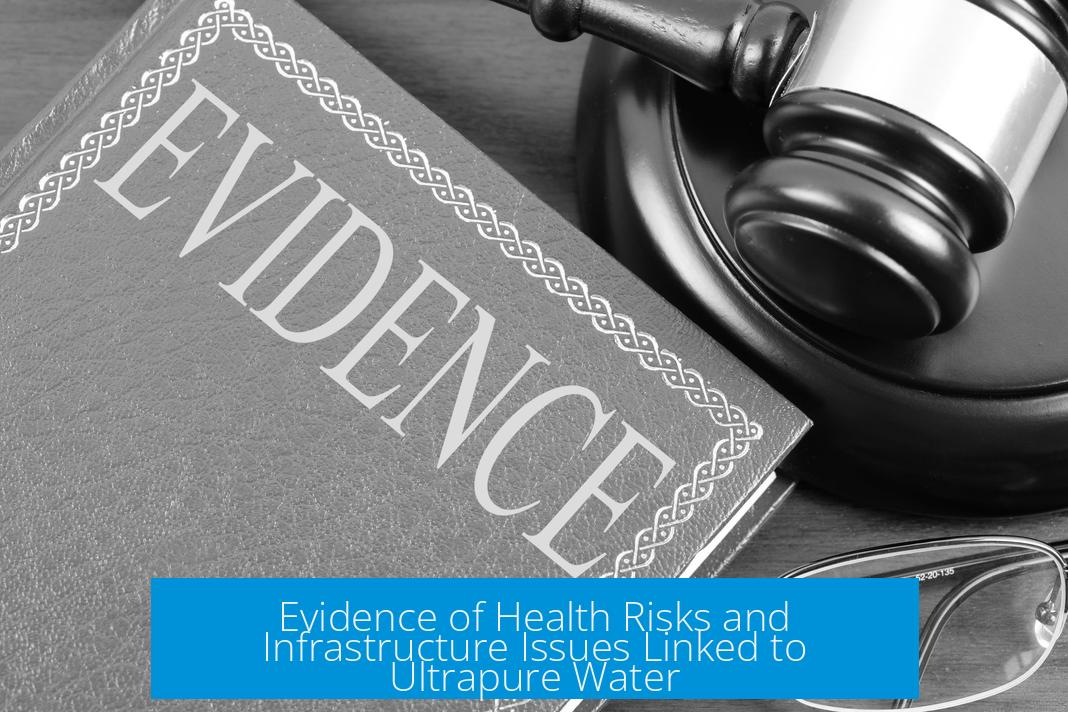Evidence for the Dangers of Ultrapure Water
Ultrapure water poses health risks primarily through its hypotonic nature, which can disrupt cellular electrolyte balance, potentially causing cell swelling and damage, including severe consequences like brain edema and hyponatremia if consumed exclusively and in large volumes over time. Additionally, ultrapure water exhibits corrosive effects on metal piping and fosters microbial growth in distribution systems. While acute toxicity from moderate consumption is not evident, long-term use without proper mineral intake presents physiological risks and infrastructure challenges.
1. Biological and Physiological Hazards

Osmotic Pressure and Cellular Effects
Ultrapure water is devoid of dissolved minerals and electrolytes, creating a highly hypotonic environment relative to bodily fluids. Drinking it introduces water without ions into cells, causing water to move inward by osmosis. This process can lead to cell swelling and rupture, as cells attempt to equalize solute concentrations.
- Cells exposed to pure water swell because the osmotic gradient favors inward water movement.
- Brain cells are especially vulnerable due to the rigid skull limiting swelling capacity.
- Severe cases may involve brain edema, coma, or death.
The osmotic imbalance disturbs the normal function of electrically charged ions such as sodium, potassium, and calcium. These electrolytes regulate nerve signals, muscle contractions, and fluid balance. Ultrapure water effectively dilutes these ions, disrupting physiological homeostasis.
Electrolyte Imbalance and Hyponatremia
Hyponatremia, defined as abnormally low sodium levels in blood plasma, is a known consequence of excessive intake of hypotonic fluids. Symptoms include nausea, headaches, confusion, seizures, and in extreme cases death.
- Drinking large amounts of ultrapure water without adequate electrolyte replacement increases hyponatremia risk.
- This condition is exacerbated by sweat-induced salt loss, as occurs with heavy physical activity.
- Normal food intake typically compensates by supplying minerals; exclusive reliance on ultrapure water jeopardizes this balance.
Research and physiological knowledge indicate that the kidneys can manage dilution of urine to certain osmolarity limits (approximately 50 mOsm/L), but prolonged exclusive consumption of ultrapure water challenges this regulatory mechanism. Long-term mineral depletion may also contribute to bone demineralization issues such as osteoporosis.
Animal Studies and Water Ion Balance
Observations in animal physiology reinforce water ion balance importance:
- Fish adapted to freshwater or saltwater environments cannot survive if placed in unsuitable salinities, due to osmotic stress.
- Research animals receive water sterilized but with normal ion content to maintain homeostasis.
- Aquatic species directly placed in ultrapure water typically expire rapidly from osmotic imbalance.
2. Corrosion Risks in Pipes and Equipment
Solvating Capacity and Metal Dissolution
Ultrapure water shows an anomalously high ability to dissolve metals and substances from surfaces it contacts due to its lack of dissolved ions. This thermodynamic tendency drives pure water to extract ions such as copper, nickel, and iron from plumbing materials.
- Flowing ultrapure water gradually dissolves metal ions from stainless steel and copper pipes.
- Corrosion manifests primarily as pitting—a localized form of corrosion causing surface imperfections.
- Over time, pitting compromises pipe integrity and may contaminate water with metals.
Laboratory and Field Observations
Lab technicians and engineers report specific effects:
- Type 1 ultrapure water causes nickel leaching from stainless steel water baths.
- Metal softening occurs with consistent exposure.
- Use of inappropriate materials such as standard PVC leads to rapid failure in systems carrying ultrapure water.
- Only corrosion-resistant materials like CPVC and certain stainless steels are suitable for lasting plumbing solutions.
Water chemistry indexes, such as the Langelier Saturation Index, guide municipal water treatment to prevent corrosion. Ultrapure water falls outside typical ranges, increasing risk without protective ions.
Practical Mitigation Strategies
Common practices involve:
- Employing plastic piping to prevent ion contamination and minimize corrosion.
- Periodic chemical cleaning (e.g., acidic treatments) to remove iron oxide “rouge” buildup on stainless steel surfaces.
- Ensuring controlled water quality parameters to reduce aggressive properties.
3. Microbial Growth and Infrastructure Concerns
Despite its purity, ultrapure water systems can facilitate microbial colonization if treated improperly.
- Absence of typical disinfectants or natural minerals removes inhibitory effects on fungi and some bacteria.
- Fungal growth observed in ultrapure water piping networks suggests contamination risk.
- This compromises both water quality and pipe longevity.
- “Normal” water contains elements deterring such growth, highlighting the protective role of certain impurities.
4. Additional Considerations and Reported Observations
Human Consumption and Safety Debates
Although anecdotes of death linked to ultrapure water exist, scientific consensus treats such cases as consequences of electrolyte disturbance due to extreme consumption combined with mineral-poor diets.
- Drinking ultrapure water occasionally or in small amounts carries minimal immediate risk.
- Excessive and exclusive consumption without dietary minerals risks hyponatremia and related complications.
- Ultrapure water’s taste is often perceived as unpleasant, limiting voluntary overconsumption.
- Warnings labeling ultrapure water as “not for human consumption” address regulatory status rather than proven toxicity.
Physical Properties and Environmental Effects
Other less documented concerns include:
- Potential physical injuries at subzero temperatures, though evidence is sparse.
- Use of ultrapure water in medical and research context avoids harmful effects by maintaining ionic composition compatible with biology.
Summary of Key Evidence Points
- Ultrapure water causes osmotic imbalance in human cells due to its hypotonicity. This effect can lead to cell swelling and brain edema if consumed extensively without electrolyte replenishment.
- Excessive consumption risks hyponatremia, manifesting as neurological and systemic symptoms potentially fatal if untreated.
- Ultrapure water’s aggressive solvating nature leads to corrosion of metal pipes, particularly stainless steel and copper, causing pitting and material degradation over time.
- Microbial colonization in ultrapure water systems can occur due to lack of natural microbial inhibitors, such as minerals or disinfectants, fostering fungi growth in pipe networks.
- The danger is mostly theoretical under typical conditions; moderate consumption with a normal diet usually prevents adverse effects.
- Laboratories and industries mitigate by using corrosion-resistant materials and routinely monitoring system integrity and water quality.
Concluding Remarks
The scientific evidence highlights that ultrapure water is not inherently toxic but presents physiological risks via osmotic and electrolyte disturbances if consumed exclusively and in large quantities without minerals. Corrosion potential requires specialized infrastructure materials and maintenance to avoid equipment damage. Microbial control remains a critical aspect of ultrapure water distribution systems.
Understanding these dangers supports informed safe utilization of ultrapure water in industrial, research, and potential human consumption scenarios while reinforcing the necessity of balanced mineral intake for health.
What is the main danger of drinking ultrapure water related to cells?
Ultrapure water causes cells to swell by moving into them, which can lead to bursting. This happens because pure water lacks minerals, disrupting the balance of electrolytes essential for cell function.
How does ultrapure water affect electrolyte balance in the body?
Drinking large amounts regularly can shift electrolyte balance. This imbalance can be serious, especially if minerals lost through sweat are not replaced, causing issues like brain swelling or hyponatremia.
Can ultrapure water cause corrosion in pipes and equipment?
Yes, ultrapure water can dissolve metals like copper and nickel over time. It can cause pitting and surface corrosion in stainless steel, affecting plumbing and lab equipment quality.
Why does microbial growth occur in ultrapure water systems?
Fungi can grow inside pipes carrying ultrapure water because it lacks natural elements in normal water that help prevent such growth. This poses maintenance challenges.
Is there evidence that ultrapure water consumption causes death?
Cases exist where people drinking only ultrapure water suffered health issues or death from electrolyte imbalance. However, death is usually linked to prolonged consumption without mineral intake.





Leave a Comment